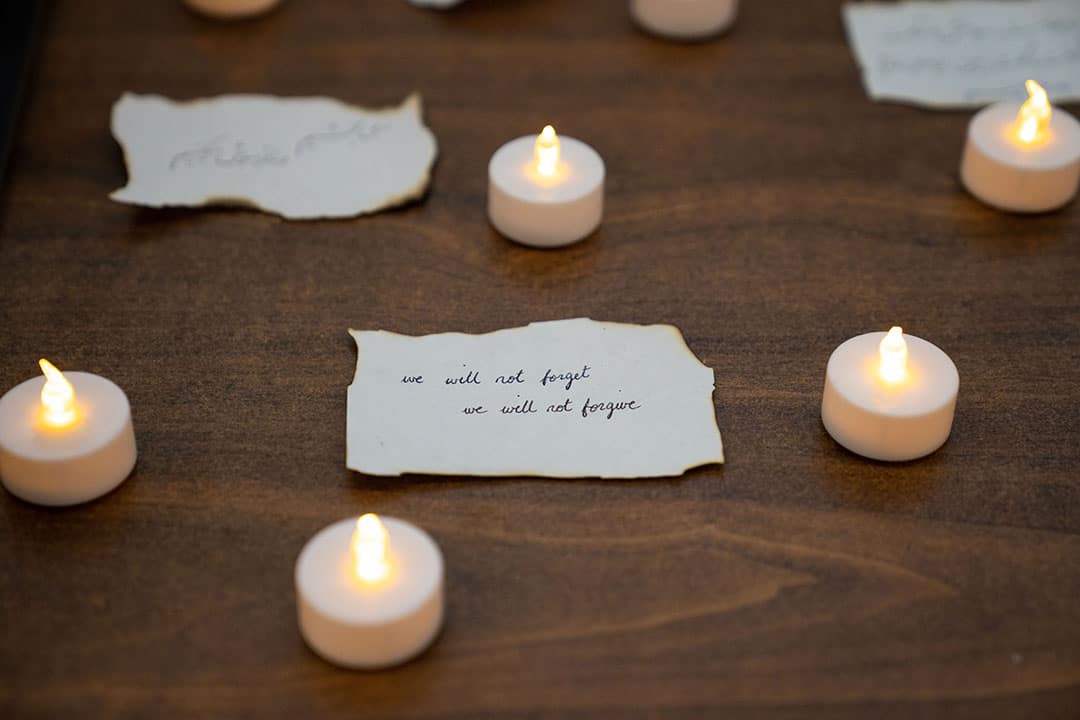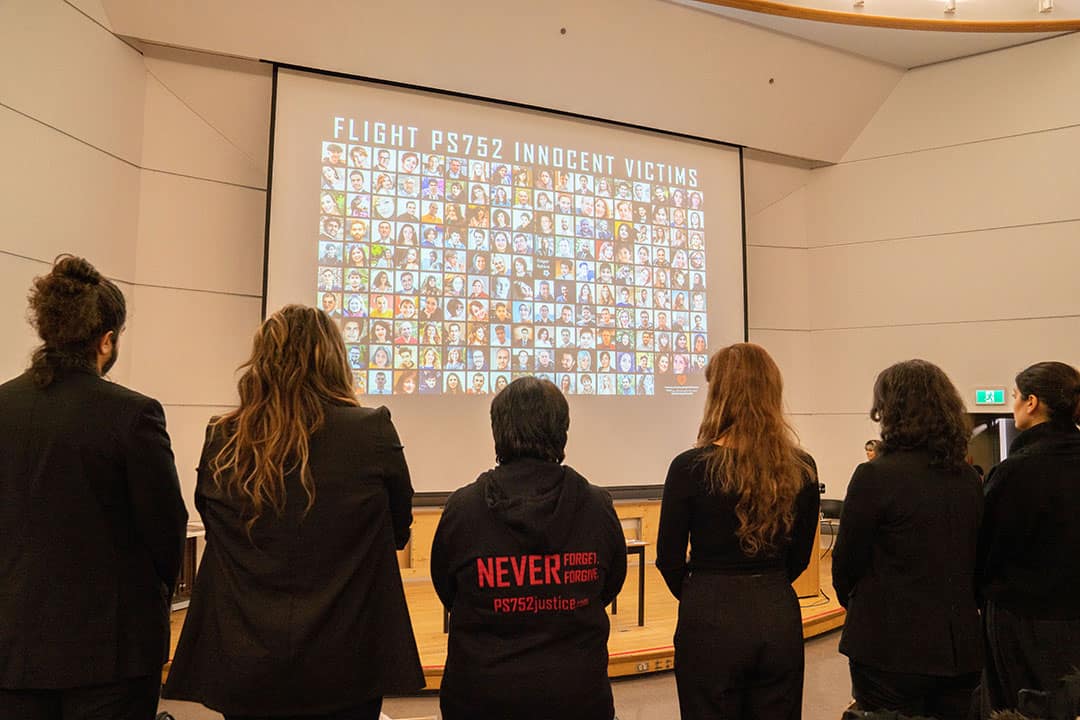Content warning: This article contains mentions of death.
On January 11, members of the U of T community gathered to commemorate the third anniversary of the downing of Ukraine International Airlines Flight PS752, which caused the deaths of eight U of T community members. The event, organized by the University of Toronto Students for a Free Iran (UTSFI), took place in an auditorium at the Earth Sciences building.
Around 90 people attended to pay their respects, including some who lost loved ones who were on the flight. Melanie Woodin — dean of the Faculty of Arts and Science — and Alexie Tcheuyap — associate vice-president and vice-provost, International Student Experience — were among the guest speakers who offered remarks.
The commemoration event took place nearly four months into widespread protests against the Islamic Republic of Iran, which are ongoing both in Iran and around the world. This unrest, initially sparked by the death of 22-year-old Mahsa (Jina) Amini in September, follows over 40 years of dissatisfaction with the current Iranian regime, which took power in 1979.
Background
On January 8, 2020, about three minutes after Ukrainian Airlines flight PS752 took off from Iran’s capital of Tehran, the country’s Islamic Revolutionary Guard Corps (IRGC) shot the plane down via two surface-to-air missiles. The plane was bound for Kyiv, Ukraine, but most passengers were headed to Canada. All 176 people on the flight died, including 55 Canadian citizens and 30 permanent residents.
Six students and two other U of T community members were among the dead. In the week that followed, the U of T community held memorial services at Convocation Hall and the Multi-Faith Centre. Other postsecondary communities in Canada, including the University of British Columbia, the University of Alberta, and McGill University, also grieved community members that had been on the flight.
Initially, the Iranian regime said that the plane crashed due to a technical problem, and a later military statement called the incident “human error.” The Iranian government’s explanation has been contested by many, including a senior Ukrainian intelligence official backed by the Ukrainian government.
Two months after the IRGC shot the flight down, those who lost family members on the flight formed an association to keep their loved ones’ memories alive and to seek justice. In the three years since the PS752 downing, the Association of Families of Flight PS752 Victims has compiled a fact-finding report of over 200 pages.
Among the report’s findings is an allegation that Iran deliberately kept its airspace open amid escalating tensions with the US, allowing it to use commercial aviation passengers — including those on Flight 752 — as human shields against US retaliation. Early in the morning on January 8, Iran had launched missiles at Iraqi bases where US forces were located, in retaliation for an American airstrike that killed Iranian General Qassem Soleimani.
In honour of those lost on Flight PS752 and in other aviation tragedies, Canada observes January 8 as the National Day of Remembrance for Victims of Air Disasters.
The commemoration service
UTSFI executive member Niloofar Ganji, who opened the event with a moment of silence, called the downed flight “[an] international tragedy, a Canadian tragedy, and a University of Toronto tragedy.” She listed several demands, including a formal RCMP investigation into the downing and the listing of the entire IRGC as a terrorist organization.
“We want the world to understand that the Islamic regime… has no place in the international community,” Ganji said.

UTSFI executive member Niloofar Ganji opened the event, with photos of Flight PS752 victims projected onto the screen behind her. JADINE NGAN/THE VARSITY
Amirali Alavi, a U of T Faculty of Law student and a member of the Board of Directors of the Association, highlighted several findings from the Association’s report, including that the Iranian regime had stolen passengers’ belongings and incorrectly identified the dead. He said that the Association has commenced proceedings at the International Court of Justice to hold individuals involved in the downing of the flight responsible.
Alavi, who lost his mother on the flight, said that the Association considers PS752 “another link in a chain of crimes committed by the regime over the past 44 years.”
As a result, the Association stands with the current protests in Iran. “A day will break in a world without the Islamic Republic,” Alavi said.
Woodin described the two computer science PhD students who lost their lives on the flight — Mohammad Saleheh, 32, and Mohammad Amin Beiruti, 29 — as “prized and promising young minds.” In their honour, Woodin said that the Department of Computer Science has established the Beiruti and Saleheh Memorial Fund, which will be granted in perpetuity to international graduate students in computer science.
Patricia Houston, vice dean of the MD Program, shared stories about the two Temerty Faculty of Medicine students on Flight PS752. Mohammad Amin Jebelli, 29, known as “Amin” to his friends, had previously practiced medicine in Iran. At U of T, he was pursuing a Master of Health Science in translational research and studying for a Medical Council of Canada qualification exam to practice medicine in Canada.
Mohammad “Moh” Asadi Lari, 23, was remembered as an energetic and passionate student by his friends and colleagues. The Temerty class of 2022 posthumously named Asadi Lari as their valedictorian, and the Faculty established an award in his honour. Asadi Lari’s sister, 21-year-old Zeynab Asadi Lari — a fourth-year UTM student and mental health advocate — also lost her life on the flight.
The sixth U of T student on Flight PS752, Mojtaba Abbasnezhad, was a 26-year-old first-year PhD student in the Department of Electrical & Computer Engineering.

A table at the front of the auditorium held candles, roses, and messages on small slips of paper. JADINE NGAN/THE VARSITY
During the commemoration, Azadeh Heidaripour, who lost her only child — 21-year-old Amir Moradi — on the flight, read a story about him from a book called It Shouldn’t Have Been Written. The book contains stories in Farsi gathered by family members of the flight’s victims. Attendees gave her reading a standing ovation, and she was embraced several times on the way back to her seat.
Kaveh Shahrooz — director of Partnerships and Legal Counsel at UTM and a lawyer who worked with the Association in an advisory capacity — noted a cross-partisan “outpouring of support” for the victims of the flight downing. “Everyone could imagine themselves on that plane,” he said.
During a U of T vigil for Mahsa Amini in October, Iranian U of T students spoke about how they and their loved ones could have been on Flight PS752. One community member told other attendees that their grandparents were meant to be booked on the flight.
Shahrooz, like Ganji and Alavi, connected the Flight PS752 downing to a desire for an end to the current Iranian regime. “What has caused so much pain over four decades has been patriarchy, a cult of death, a system of oppression. We should remember to replace those things with their opposites: woman, life, freedom,” he said.
“We will not forget the victims of PS752. We will seek justice every day,” Shahrooz added.


